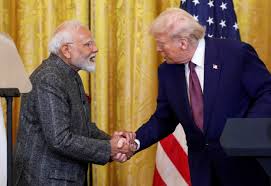Congress flags concerns over ‘Trump using MASALA deals’ as India-US negotiate trade pact, cites think tank warning

New Delhi, July 14 — The Indian National Congress has raised serious concerns about former US President Donald Trump’s reported influence on the ongoing India-US trade talks. The party alleged that Trump is using “MASALA deals” to sway Indian policy and demanded full transparency from the government. Their concerns are based on a recent report by a Washington-based think tank that warns of political motivations behind these deals.
What Are “MASALA Deals”?
“MASALA deals” stands for Modi-And-Strategic-Alignment Leveraging Agreements. This term, coined by policy analysts, refers to bilateral agreements that may appear mutually beneficial but come with hidden political agendas. Critics believe these deals involve trade-offs in defense, technology, or tariffs in exchange for electoral gains—particularly in the United States.
Congress Demands Answers
Congress spokesperson Jairam Ramesh accused the government of compromising India’s interests to benefit foreign leaders.
“We are deeply concerned that the trade deal under discussion may serve Donald Trump’s campaign more than India’s economy. The government must disclose the nature and scope of these negotiations,” he said on Sunday.
He cited findings from the Center for Strategic Trade and Accountability (CSTA), which warned about deals being timed to influence US elections.
What the Think Tank Said
The CSTA’s report, titled “Strategic Sugars: How Trade Deals Shape Political Campaigns,” highlights how global trade agreements often help politicians build campaign narratives. It claims some US political actors are pressuring negotiators to finalize deals with India before the 2024 US election.
The report warns India to be cautious in areas like defense procurement, semiconductor technology, and energy pricing.
A Question of Sovereignty
Congress says the Modi government must prioritize national interests. The party has called for a full parliamentary debate before any trade deal is finalized.
“Any agreement affecting farmers, digital policies, or small businesses must be discussed in Parliament. India cannot become a tool in another country’s political campaign,” Ramesh added.
BJP Calls It Baseless Allegation
The BJP dismissed these concerns as politically motivated. Party MP Rajeev Chandrasekhar responded by saying:
“Congress is spreading baseless fears. India negotiates from a position of strength today. No agreement will be signed that undermines our interests.”
He added that Congress cannot accept India’s growing influence on the global stage and prefers outdated diplomacy.
Status of India-US Trade Deal
India and the US have been negotiating a trade pact since 2018. Talks had stalled under the Trump administration due to disagreements over tariffs, dairy imports, and digital policy. However, negotiations have resumed in recent months.
Key issues still under discussion include:
- Market access for Indian generic medicines
- Lower tariffs on agricultural goods and medical equipment
- Easing of US restrictions on dairy and tech exports
- Rules around digital trade and data localization
Officials on both sides have hinted that a final agreement could be announced before the end of the year.
Why Trump’s Name Keeps Coming Up
Although Trump is no longer in office, he remains a strong force in US politics. He is the leading Republican candidate for the 2024 presidential election. His close ties with Indian-American business groups and past public events with Prime Minister Modi, such as “Howdy Modi” in Houston and “Namaste Trump” in Ahmedabad, have kept him in the spotlight.
Critics believe his allies are working behind the scenes to create deals that show Trump as a successful negotiator on the global stage.
Strategic Stakes for India
Experts warn that India must not rush into any agreement without understanding its long-term impact. Former National Security Advisor Shivshankar Menon said:
“India must avoid becoming part of another country’s political campaign. Trade decisions should reflect our economic goals, not another nation’s electoral needs.”
Public Demands Transparency
Several civil society groups and trade experts have joined Congress in calling for greater transparency. They urge the government to release a white paper detailing the key elements of the trade discussions.
With global attention on the India-US trade partnership, observers say that transparency and accountability will be critical for maintaining public trust.






